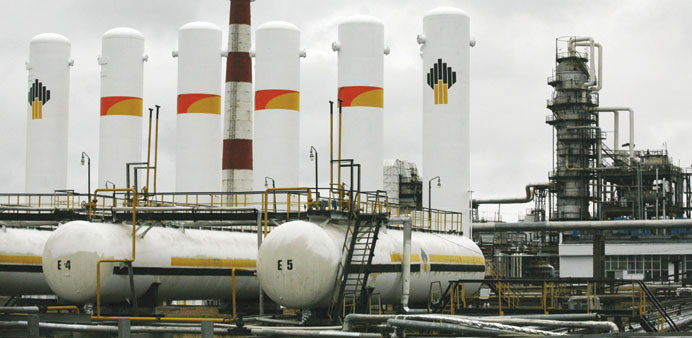A general view of Rosneft’s Achinsk oil refining factory. Rosneft has offered Chinese investors a stake in its huge Vankor oil project, its second biggest, which pumped an average 442,000 bpd in August.
Reuters/Moscow
Russia’s oil output rose in August helped by an increase in condensate production at Gazprom, showing that energy supplies so far have not been affected by sanctions over the country’s military invasion of Ukraine.
Oil production rose 1% to 10.52mn bpd in August from July due to state-controlled Gazprom and projects with foreign companies, Russian Energy Ministry data showed.
Production in Russia, which includes crude oil and gas condensate, was still the world’s highest in August. Its closest rival, Saudi Arabia, produced an average 9.75mn bpd last month, a Reuters survey showed.
Western nations have imposed sanctions on Moscow over its annexation of Crimea in March and its stance over the war in eastern Ukraine, warning of further measures if Russia does not help to stop the conflict escalating.
The measures include a ban on investments into new equity or debt with a maturity longer than 90 days for a number of Russia’s largest companies, as well as on exports of equipment for new oil projects.
Sanctions have not yet hit oil production as the current measures are aimed at new projects which are years away from coming on stream. But as Western funding closes off or becomes too expensive, companies are already looking to cut investments.
Lukoil, Russia’s second-largest oil producer whose output was flat month-on-month, last week said it plans to cut its investments by $2bn next year.
“Struggles in accessing foreign funding may affect investments in oil production,” Valery Nesterov, an analyst with Sberbank CIB, said, warning that output levels may also be hit in the next couple of years.
Russia’s largest oil producer Rosneft, which has been targeted by sanctions, has offered Chinese investors a stake in its huge Vankor oil project, its second biggest, which pumped an average 442,000 bpd in August.
The ministry estimates that Russia will need around $150bn in annual investments to sustain output at mature fields and bring new fields on stream.
But sanctions look set to increase. Italian Foreign Minister Federica Mogherini told the European Parliament yesterday that European Union governments will decide on a package of new sanctions against Russia by Friday.
In the meantime, Russian Energy Ministry data shows that output at projects under production-sharing agreements (PSA) with foreign-owned firms continues.
There are three PSAs in Russia – the Total-led Kharyaga project, ExxonMobil -led Sakhalin-1 and Gazprom-controlled Sakhalin-2.
Production at state-controlled Gazprom jumped by 36% month-on-month in August to 306,000 bpd. Output at projects under PSAs rose 12% to 241,000 bpd.
Alexander Kornilov, an analyst with Alfa Bank, said Gazprom was just returning to usual condensate production levels after a drop in July following maintenance works. Gazprom’s Surgut plant was out of operation for most of July.
Sberbank CIB’s Nesterov said monthly production at PSA projects was volatile because of maintenance issues, including at some offshore production platforms. In June, output was 303,000 bpd.
In tonnes, Russian oil output reached 44.472mn in August versus 43.949mn in July.
Gas production was 42.74bn cubic metres (bcm) last month, or 1.38 bcm a day, versus 42.68 bcm in July. Gazprom produced 26.28 bcm, or 848 mcm per day, in August, down from 26.72 bcm a month earlier.
Russia’s Energy Ministry has forecast oil production to reach 525mn tonnes this year (10.54mn bpd), up 0.4% year-on-year.

